Specialized Pathways
During the 1st year of residency, Combined Internal Medicine-Pediatrics residents can apply for any of these 5 optional specialized pathways through the medicine program to further augment their training. These pathways tailor the clinical and educational experience through the 2nd - 4th year of residency training and include opportunities for special elective rotations and focused didactic sessions.
Primary Care Pathway
Pathway Director: Stacy Charat, MD
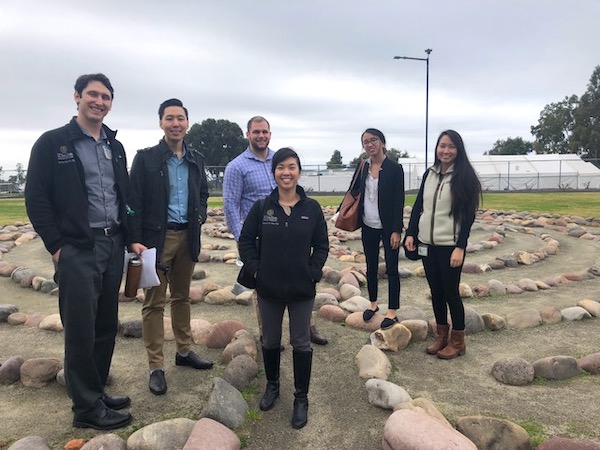
About the Pathway: The Primary Care Pathway provides an individualized educational experience for residents interested in pursuing careers in primary care. The pathway complements our robust ambulatory medicine training with additional continuity clinic experiences, supplemental didactic and social justice curricula, and exposure to a range of ambulatory care clinics with high relevance to primary care practice.
Elements of the Primary Care Pathway
- Ambulatory Care Blocks: Residents in the Primary Care Pathway participate in one, 4-week ambulatory care rotations annually. Two weeks of each ambulatory rotations are dedicated to customized primary care blocks, and two weeks are dedicated to ambulatory electives.
- Elective Rotations: Residents in the primary care pathway work with the pathway director to prioritize elective selections that will best prepare them for primary care practice. They are encouraged to select outpatient electives in endocrinology, dermatology, underserved medicine, correctional medicine, obesity medicine, pain medicine, psychiatry, and surgical subspecialties. These are in addition to the required rotations in geriatrics, gender medicine, musculoskeletal medicine, and neurology.
- Primary Care Blocks: Each block consists of a mix of continuity clinics, subspecialty clinics, weekly primary care academic half-days, social justice half-days, and unique clinical and educational opportunities. We strive to individualize each resident's rotation schedule based on personal interests and career goals.
Sample Weekly Schedule for Primary Care Block
| Monday | Tuesday | Wednesday | Thursday | Friday | |
|---|---|---|---|---|---|
| a.m. | Primary Care Morning Report Subspecialty Clinic: Gynecology |
Suboxone Training Session | Subspecialty Clinic: Endocrine | Home Visits | Site Visit: Prison Health System |
| p.m. | Continuity ClinicResearch Mentoring Evening | Continuity Clinic | Primary Care Academic Half-Day | Continuity Clinic | Friday School:Primary Care Journal Club |
- Events/Site Visits: Special events during the primary care blocks include primary care morning reports, career panels, X-waiver training for buprenorphine prescribing, long-acting reversible contraception training, and individualized preparation for the job search process. We also take site visits to learn about different models of care, including the prison health care system, integrative medicine clinics, and private medical practices. Our new social justice curriculum includes visits to six community agencies focusing on reproductive justice, refugee health, correctional medicine, elder services, environmental justice and healthcare for people experiencing homelessness.
- Didactics: Wednesday afternoons of each rotation are dedicated to didactics related to clinical and non-clinical topics to prepare residents for general internal medicine practice. Sessions include topics such as outpatient pain management, agenda-setting in primary care, the business of medicine, EMR data analysis, common ENT complaints, dermatologic procedures, common eye complaints, motivational interviewing, and smoking cessation.
- Scholarly Work: Residents in the pathway are encouraged to create scholarly work including clinical vignettes, original research projects, and educational innovations and submit their work for presentation or publication. The primary care blocks are scheduled to overlap with the Society of General Internal Medicine conferences to promote attendance and submission.
- Mentoring: Primary care residents are individually mentored through the career exploration and job search process by the pathway director and an assigned member of the GIM faculty. We hold an annual career panel with representatives from local hiring organizations to facilitate the job application process.
The primary goal of the pathway is to help our residents find the best possible career that allows them to achieve their professional goals while maintaining a healthy work-life balance.
Resident as Clinician Educator (RACE) Pathway
Pathway Co-Directors: Sean Kenmore, MD; Connie Chace, MD
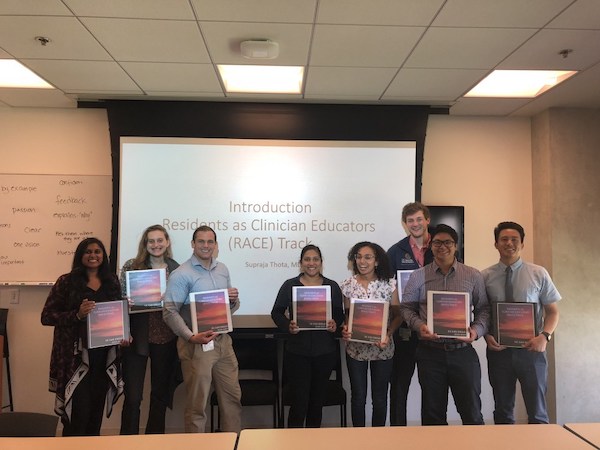
About the Pathway: The RACE (Resident as Clinician Educator) Pathway is a training pathway devoted to building clinical education skills and a diverse teaching portfolio. Residents are paired 1:1 with faculty mentors who provide focused training in medical education and oversee resident progression towards professional teaching goals. Additionally, the RACE Pathway runs sessions for all residents via our Friday School didactics.
The RACE Pathway consists of 3 primary components:
- Didactic Workshops: These small-group sessions focus on various educational topics, such as curriculum development, giving effective feedback, and crafting a teaching portfolio.
- Two-week annual RACE Pathway elective: This is a teaching elective block wherein residents focus on leading teaching workshops and conferences with medical students and resident peers.
- Longitudinal Scholarly Project: Residents create an education project of their choosing. Previous projects include podcasts, a note-writing course for MS3's, and sub-curricula within Friday School.
Hospital Medicine Pathway
Pathway Director: Ali Farkhondehpour, MD
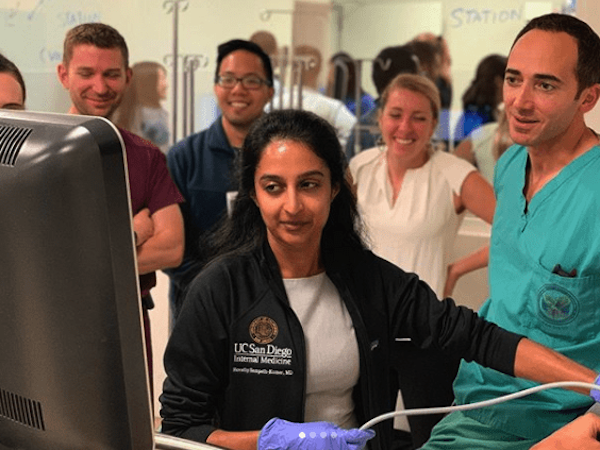
About the Pathway: The Hospital Medicine Pathway provides specialized training to residents who are interested in becoming leaders in academic hospital medicine. Residents in the pathway receive relevant, unique inpatient training, specialized didactics, one-on-one mentorship, and opportunities to participate in a variety of quality improvement projects.
- Close one-on-one mentorship with an assigned academic hospitalist
- A 4-week "Junior Hospitalist" rotation at the UCSD Medical Center in La Jolla
- Didactics on patient safety, billing/coding, business of hospital medicine, inpatient medical consultation, ethics, and more!
- Hands-on point-of-care ultrasound rounds
- Participation in a 2-week "Professional Development" block, including unique rotations with IR, Radiation Oncology, Speech Therapy, and more!
- Field trips to long-term acute care (LTACs) and skilled nursing facilities (SNFs)
- Participation in hospital medicine grand rounds and hospital medicine journal club
Global Medicine Pathway
Pathway Director: Annie Cowell, MD
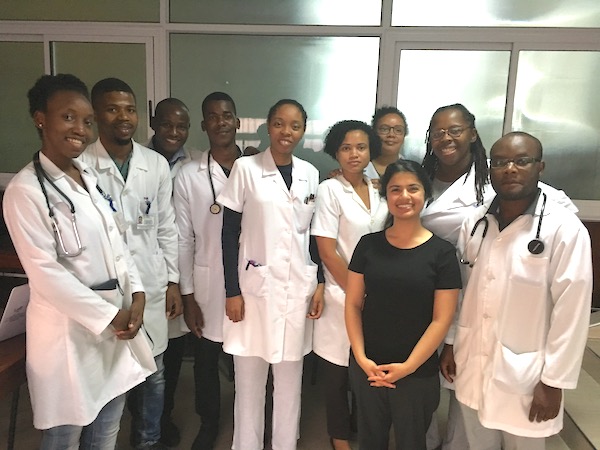
About the Pathway: The Global Medicine Pathway at UC San Diego leverages our interdepartmental and international relationships to provide residents with opportunities to learn about and provide care in underserved communities around the globe. This includes our multidisciplinary workshops, simulation sessions, and elective rotations with our international clinical partners in Mozambique and Mexico.
-
Simulation workshop in collaboration with other departments (Emergency Medicine, Reproductive Medicine, and Surgery) centered on providing care in limited-resource settings
-
1- to 2-month elective rotation at Maputo Central Hospital in Maputo, Mozambique, with housing provided by the residency
-
Underserved medicine elective also available, providing care for correctional systems in San Diego
-
Opportunities to participate with tele-ICU with hospitals in Tijuana, Mexico
-
Scholarly project in Global Medicine
Integrative Medicine Pathway
Pathway Co-Directors: EB Sladek, MD; Samantha Spilman, MD
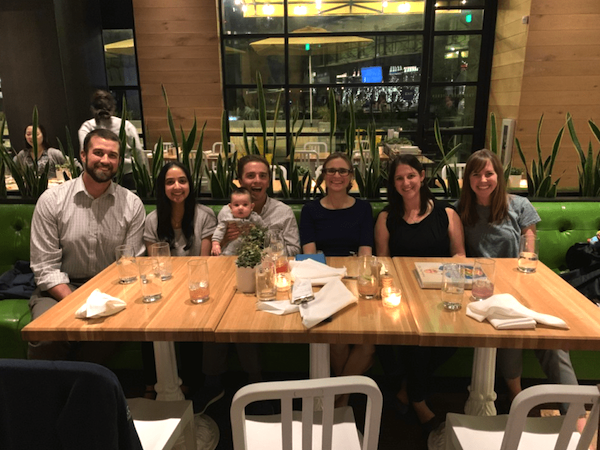
About the Pathway: The Integrative Medicine Pathway focuses on exploring a holistic approach to patient care. In this pathway, residents explore the evidence surrounding various traditional healing techniques and how they blend into Western medicine. The pathway features quarterly, interactive didactics in which they learn general principles of integrative medicine as well as disease specific treatments. They also are assigned an integrative medicine faculty mentor and work one-on-one on a scholarly project. UC San Diego is the 5th internal medicine program nationwide to participate.
Year 1: Focus on general principles of integrative medicine
- Quarter 1: Nutrition
- Quarter 2: Vitamins and supplements
- Quarter 3: Wellness (physical activity, sleep medicine, mindfulness, burnout
- Quarter 4: Tools in integrative med (OMM, acupuncture, motivational interviewing)
Year 2: Focus on disease specific treatments and principles
- Quarter 1: Oncology and pain management
- Quarter 2: Women's health and preventive medicine
- Quarter 3: Cardiovascular health and microbiome
- Quarter 4: Presentation of capstone project
Social Justice and Advocacy Curriculum (SJAC) Pathway
Pathway Director: Megha Shankar, MD
About the Pathway:
The Social Justice and Advocacy Curriculum (SJAC) Pathway is an award-winning training program that provides residents with an avenue to tailor their education to a health equity lens. It is open to internal medicine and med/peds residents starting in their PGY2 year. Residents in the pathway participate in facilitated discussions, community engagement activities, health equity focused electives, and legislative advocacy opportunities. The SJAC Pathway is built to train residents to advocate for patients in the way that makes sense for their career goals, whether that is focusing on individual patient advocacy, community partnerships, legislative advocacy, and/or health equity research. Final year residents will complete a capstone project on a topic of their choice and are encouraged to present this as scholarly work.
Facilitated discussion session topics include:
- Healthcare for unhoused patients
- Refugee, immigrant, and migrant health
- Environmental justice
- Carceral medicine
- Substance use disorder
- LGBTQ+ health
- Intimate partner violence
Health equity related electives include:
- Underserved Medicine
- Border Health
- Shiprock, New Mexico (away rotation)
- Corrections Medicine
- LGBTQ+ Elective
- Owen (HIV) Elective
- Health equity research elective
Community engagement activities include:
- Harm Reduction volunteer opportunity on Saturday mornings in East Village
- International Health Clinic volunteer opportunity in Tijuana Progreso on one Saturday per month
- Community Health & Resource Fair volunteer opportunity with A Healthier Me on first Wednesday of every month
- UCSD Student-Run Free Clinic volunteer opportunities every week
- RISE mentorship program: “near-peer” mentoring program at UCSD that helps students who are underrepresented minorities in medicine navigate the final years of medical school
- San Diego Pride: San Diego organization that organizes the annual PRIDE parade as well as runs multiple year-round education, advocacy, and community service programs.
Legislative advocacy opportunities include:
- California ACP Sacramento Leadership Day
- National ACP Hill Day
- UC Advocacy Day (in conjunction with the Primary Care Track/Pathway)
- California Medical Association Legislative Advocacy Day
